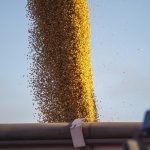China's Sinograin has bought nearly 500,000 metric tons of U.S. soybeans this week for shipment in March and April, paying more for U.S. supplies for state reserves rather than buying cheaper Brazilian beans, two U.S. traders familiar with the deals said.













